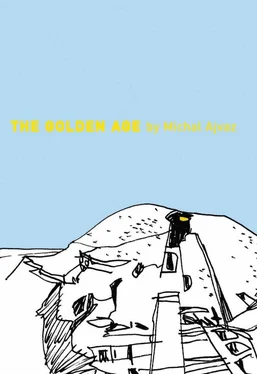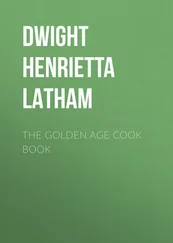Michal Ajvaz - The Golden Age
Здесь есть возможность читать онлайн «Michal Ajvaz - The Golden Age» весь текст электронной книги совершенно бесплатно (целиком полную версию без сокращений). В некоторых случаях можно слушать аудио, скачать через торрент в формате fb2 и присутствует краткое содержание. Год выпуска: 2010, Издательство: Dalkey Archive Press, Жанр: Современная проза, на английском языке. Описание произведения, (предисловие) а так же отзывы посетителей доступны на портале библиотеки ЛибКат.
- Название:The Golden Age
- Автор:
- Издательство:Dalkey Archive Press
- Жанр:
- Год:2010
- ISBN:нет данных
- Рейтинг книги:4 / 5. Голосов: 1
-
Избранное:Добавить в избранное
- Отзывы:
-
Ваша оценка:
- 80
- 1
- 2
- 3
- 4
- 5
The Golden Age: краткое содержание, описание и аннотация
Предлагаем к чтению аннотацию, описание, краткое содержание или предисловие (зависит от того, что написал сам автор книги «The Golden Age»). Если вы не нашли необходимую информацию о книге — напишите в комментариях, мы постараемся отыскать её.
is Michal Ajvaz’s greatest and most ambitious work.
The Golden Age
The Golden Age — читать онлайн бесплатно полную книгу (весь текст) целиком
Ниже представлен текст книги, разбитый по страницам. Система сохранения места последней прочитанной страницы, позволяет с удобством читать онлайн бесплатно книгу «The Golden Age», без необходимости каждый раз заново искать на чём Вы остановились. Поставьте закладку, и сможете в любой момент перейти на страницу, на которой закончили чтение.
Интервал:
Закладка:
When the lamps in the auditorium are extinguished and the door opens, the spectators are presented with a golden statue that depicts a statue of jelly. The door closes swiftly and then re-opens, the turntable turns, and before the eyes of the astonished courtiers a statue begins to move. To begin with this movement is little more than a gentle wobbling in the breeze, but then a fish jumps above the surface before disappearing back into the jelly. (In fact, fish modelled at various points of their jump are attached to the statue of the jelly statue by thin metal rods at points in consonance with the movements of the breeze.) From the left-hand side of the wall there then emerges a golden figure. When this figure reaches the statue, it turns to the auditorium and bows, just as the bewildered Gato did two years earlier. As if in a nightmare, the stupefied courtiers follow the familiar story: the golden figure of Gato steps up to Mii’s (golden) statue; the golden figure enters the golden statue, which is wobbling in the (imaginary) breeze; for a time the figure is out of sight, but then it re-emerges and turns to the audience with a look of anguish on its face, lifts up its arms fringed with golden fish, then falls back into the golden statue, which itself is a representation of a table set between the royal castle of Vauz and the sea.
Believing the performance to be at an end, the courtiers allow their horror to subside. But the turntable continues to turn. Once again the golden figure approaches the golden statue; again he steps into it, battles with the fish, and falls back into the gold. The monotonous golden film lasts five hours, after which time Hios makes a signal of command and the wings of the door crash shut for the last time that night. No one — not even Uddo — has dared to leave before the end of the performance. Although Hios and Uddo have been sitting next to each other throughout, not once has the daughter turned to look at the mother. Once the film has ended, Hios stands up in front of the closed door and announces that the spectators may go to bed, adding that the next performance will begin at the same time tomorrow.
Thus does the grim serial begin. Performances are held every night. And every night the courtiers are forced to watch the death of a golden Gato, over and over, so that they begin to fear for their minds. Every night Hios is present from beginning to end; she always sits next to her mother and watches the stage with a rapt expression. The guards stand in the aisles, drawing amusement from the discomfort of the courtiers. Before each performance starts, no one knows how long it will last — not even Hios, who always makes this decision when it is in progress. Often it lasts until morning, but still the guards allow no one to leave before the end, not even those who are taken ill or need to go to the toilet. Anyone who falls asleep is woken by a guard. For many years afterwards, the awful memory of daybreak in the palace park will return to the courtiers in their dreams. When at last the dim light of day washes over the amphitheatre, it is accompanied by cries, wails and groans; someone might howl for several minutes before falling silent; there is a stink of sweat, urine, faeces and vomit. Soon all these liquids have soaked into the velvet cushions of the seats, and every evening the blend of stinks greets the involuntary spectators as they make their way to the amphitheatre; soon this has penetrated the palace and it seems it will descend to the town and settle in its streets.
Terror and invasion
As soon as Nubra finishes work on the golden theatre, Hios — by now at the deepest point of her madness — sets him on another task. She dreams of a great golden drama that will celebrate her and Gato’s love, but first it is necessary to punish her mother. Hios presents Nubra with her design of a monument that is to stand on all the squares of the capital. These monuments are to depict executioners who are torturing, raping and otherwise humiliating Uddo by the vilest means the dark thoughts of the princess can invent. Nubra is horrified; as a lover of games and rebuses, he has no liking for commissions such as this, and he despises Hios’s dreary, clumsy hate that is slowly developing into the purest form of madness. But he is no more able to decline this order than Mii was able to decline the order to produce a statue in liquid for Taal. Once the dreadful monuments are in place, every morning Hios takes her mother around the squares on a tour of hate; Hios orders the coach to stand for at least an hour in front of each statue. Hios never addresses her mother, and whenever Uddo closes her eyes at a statue, Hios strikes her across the face and neck with a riding whip until she opens them. From these trips Hios escorts her mother directly to an all-night performance in the palace park. After a while Uddo abandons all resistance: she weeps no longer, but follows dumbly the changing scenes of the day-time and night-time statue performances.
By this time everyone at the palace is dull-witted or mad in some way. The courtiers grow accustomed to the terror practised on them by the praetorian guards and to the glassy-eyed expression of the queen; they grow accustomed to the many-hour-long re-enactments of the golden death, to the dreadful monuments, to the humiliation and stink of the amphitheatre. They are indifferent to the leaking of bodily fluids and stains on garments and upholstery — they wear the reeking splotches on their clothing like dark jewels. And the madness, stinking juices and bad dreams descend from the palace to seep into the streets of the town, the country at large, the waves of the sea. In the people of the town, fear of the guards’ patrols and raids (which often are the same banditry) mixes with joy at the general state of anarchy; in most cases, wrongdoing is tolerated when it does not affect the well-being of the guard or the princess, when its scope is limited to a house or the town, or when it happens to benefit some nobleman or other. The avarice and thirst for power of the guard is a fine complement to the disinterested, ostentatious cruelty of the queen. The people of the town blunder about stupidly in the shadows of the obscene monuments. Some days they cower in their homes and bolt the doors, listening to the sounds of carts and footfalls beyond the door; other days they are drunken participants in the looting of mansions — when a property seizure is in progress, they wait for the guard to leave before bursting into the paralysed house through its fractured doors.
Such brutal scenes as these were by no means exceptional in the Book . Mostly I came across them in deep insertions, perhaps in a pocket concealed inside another, as if I were descending to the dungeons of a building to find there the foundations of the ancient palace of a despot. Perhaps, I thought, the poison in the insertions will soak through to higher levels of the Book and the whole thing will become one obscene, cruel dream. And as the borders of all worlds were weak on the island, and the games of the islanders spilled over them, I even wondered if the evil in the Book might conquer the quiet life of the island, which would then begin to resemble that of Devel in Hios’s years.
I still wonder how it is possible that such dark images were born in the minds of the peaceable islanders. Perhaps the slow crystallization of shapes and systems into the shapeless, the various forms of which was the islanders’ main source of entertainment, was not as innocent as it seemed. The disintegration of language and order that occurred when these encountered labyrinthine shapes or passed over borders, released a playful force that built and revived different orders and languages in an endless kaleidoscope; but this force was itself a combination of many forces, whose tones sounded in it and which could render themselves independent. It is probable that a force could be distilled that would rise above matter and find its aim and its delight in the crushing of matter, without the fragments thereby created being used in new games. And this force would begin to elaborate its own figures, to write in hieroglyphs of evil, to set up its own dreadful world.
Читать дальшеИнтервал:
Закладка:
Похожие книги на «The Golden Age»
Представляем Вашему вниманию похожие книги на «The Golden Age» списком для выбора. Мы отобрали схожую по названию и смыслу литературу в надежде предоставить читателям больше вариантов отыскать новые, интересные, ещё непрочитанные произведения.
Обсуждение, отзывы о книге «The Golden Age» и просто собственные мнения читателей. Оставьте ваши комментарии, напишите, что Вы думаете о произведении, его смысле или главных героях. Укажите что конкретно понравилось, а что нет, и почему Вы так считаете.












